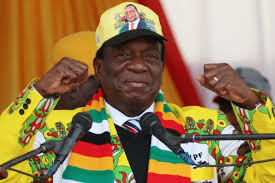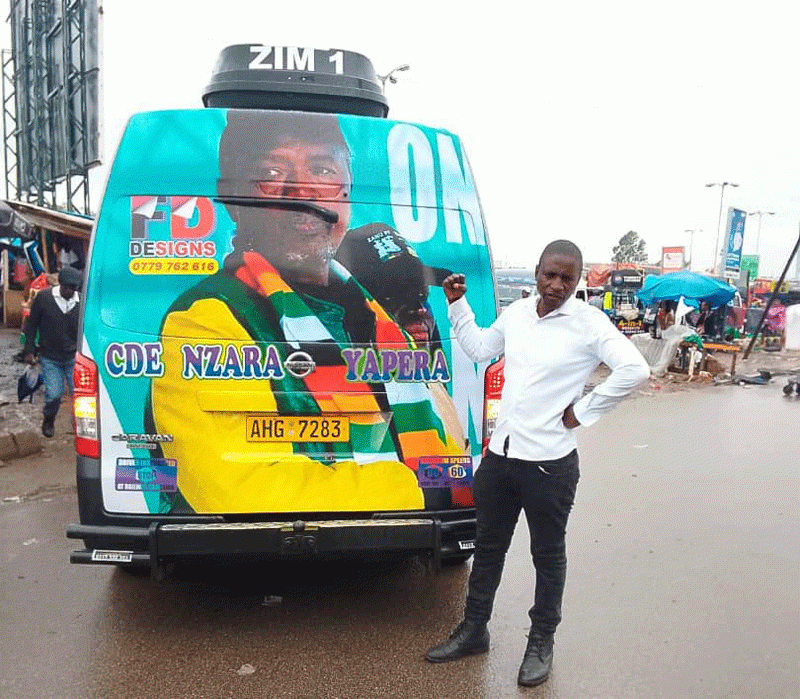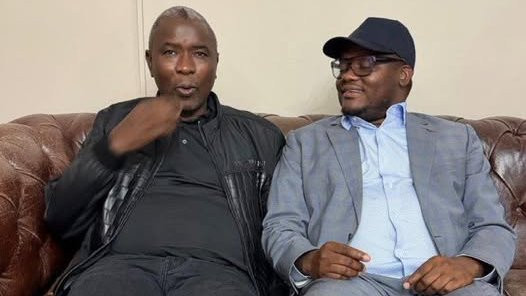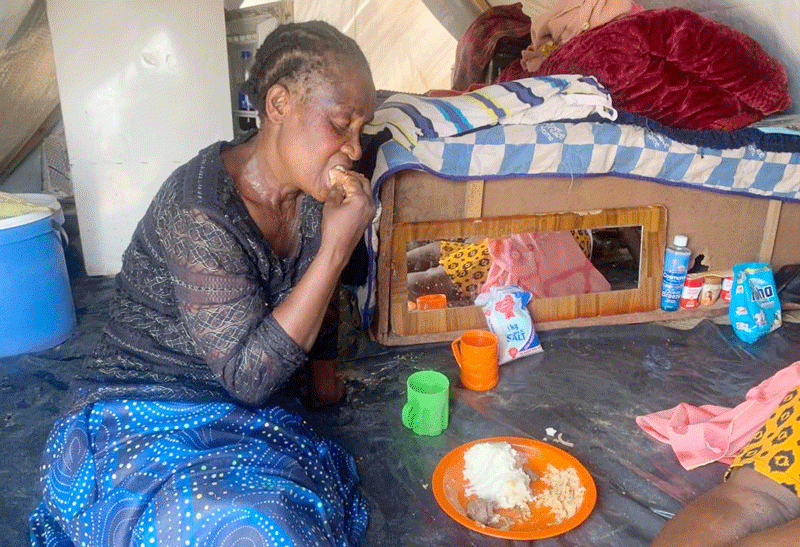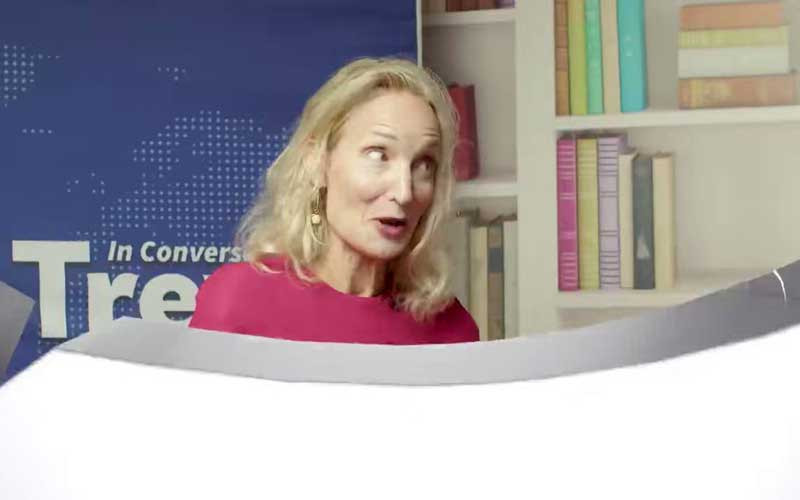
Journalist and book lover Kate Chambers says her book donations in Zimbabwe are inspired by the country’s reading culture and her love for libraries.
Chambers (KC), who grew up in the United Kingdom, helps receive and distribute books throughout Zimbabwe. She spoke to Alpha Media Holdings chairman Trevor Ncube (TN) on the platform In Conversation with Trevor about her passion and what drives her.
Below are excerpts from the interview.
TN: Kate Chambers, welcome to In Conversation With Trevor.
KC: Thank you Trevor. It is wonderful to be here.
TN: So Kate this is for us, a recognition of the beautiful work that you do, we absolutely love seeing you travelling around the country, distributing books, honouring authors.
I absolutely love what you do, and the question is why do you do this stuff?
- In Conversation with Trevor: Chisamba: Let’s be proud of ourselves
- In Conversation with Trevor: ‘I tried to change Zanu PF from within’ – Margaret Dongo
- In Conversation with Trevor : How car crash changed my life
- In Conversation With Trevor: ‘We lost our humanity’
Keep Reading
KC: Thank you, and I am honoured by what you say.
There are two very simple reasons, one is that I love being a part of a community of readers and writers.
There are amazing writers in Zimbabwe, there are lots and lots of people who love reading, and I think there is a very special recognition between writers and readers.
So it is wonderful to be a part of that.
The other is a very personal thing, I love libraries.
I grew up in the east of England in a small market town called Horncastle.
It had a library in which I spent a lot of time.
It is not a particularly old library, but it is built over a very historic part of the structure of the town.
So it is built over a Roman wall, so as a child I would walk into that library, walk over the Roman wall, walk into this amazing space where, I mean it is by no means the most impressive library in the UK, but there were spaces for children, there were spaces where you could sit with newspapers (and) there were people to help you with your research.
My parents would drop us off there while they did errands, so I would go with my sisters.
I would go there to do homework. It would be raining outside as it often is in the UK, and those are just special memories.
TN: Wow.
KC: Then I went to university, spent a lot of time in libraries there, and I have to say that wherever I have travelled I have always tried to go and see the library.
So when I came to Zimbabwe I also came to see libraries here.
TN: Interesting about the library that you describe in such graphic detail; do you think the way that you were raised, your parents, did you see your parents reading?
Is that how you got to like books?
KC: That is such a good question. My parents always had books piled on their bedside tables, and I of course did not notice it at the time or I did not register it as being important, but I always saw my parents with books.
My mother would read to us in the car on car journeys, so that is a very happy memory.
My father was, I like to say he was a poet, he would say he was not a poet he is a chemist, but he used to make up rhymes for us when we were very small.
He does it for his grandchildren as well.
So I was always in a place where text and writing and words were important, and it is what I have tried to do for my own children as well.
TN: The connection? When does the connection happen between...I used to see books on their bed side but it did not mean anything at that particular moment?
I am asking because a lot of us read, have books around us, but our kids are not reading.
I am hoping that at some point they will get to a point where they say I saw mom reading, I saw dad reading, and I am reading.
I am trying to get that connection for you, when did you like, wow I saw books on his/her bedside table and that is why I am reading.
KC: I do not think that I really thought about it until I became a parent myself.
And it was stressed to me then that books have to be accessible to children.
So you need books at child's level, and of course bedside table level is where your children are playing around.
I think though, that I saw, I mean I instinctively saw my parents turning pages.
Whether as a very young child whether I connected that with books on the bedside table I am not sure, but I do know that they made books accessible.
We did not have lots and lots of children's books, my father's study was full of chemistry manuals and commentaries.
I think I had a small shelf of fiction or books that were my own, but they made sure that we saw them reading books and they made sure that libraries were accessible, including school libraries.
TN: The other reason why I thought we should sit and have this conversation is because books have been hugely important for my development. I am dyslexic, and it took me a long time to start reading.
I actually started reading I think when I was 30, when I was the editor then of the Financial Gazette.
I did not like reading because I battled reading until a good friend of mine, may his soul rest in peace, gave me a book and said I want you to read this book and I started reading that book.
From then on I have been turning pages.
I cannot (afford) not (to) have a book by my side, and it has been a big part of who I have become.
Does that resonate with you at all?
KC: Yeah it does, and I think it is the phrase you use there about turning pages.
I think that we all come to books from a different place, and quite a few years ago I have a friend who worked in publishing in London, and when I had my first child who is a boy, she said Kate all that matters is that they turn pages.
And so she encouraged me to get car magazines and just to make sure that my son was turning the pages of car magazines and getting that instinct to read out, or to just to get acquainted with text and pictures.
I think also it is really important to not limit our view of what books are.
They do not always have to be fictional stories, they do not always even have to be written down, podcasts are another form.
So I think that has been part of my journey, understanding those things.
TN: Talk to me about your work which I have been following quite closely on Twitter mainly, and a bit of it on Instagram.
Where you get books and you distribute them?
Where do you get those books? Where do you distribute them?
Why do you do this?
You have already answered that question, but perhaps where do you get them and where do you distribute them?
How do you decide where you send the books?
KC: That is a really good question. It is a long project. It started in about 2010/11. It came from personal experience.
I was in Zimbabwe at the time and I had two really key experiences that made me think again about books and the importance of them.
One was a mother of a child about my son's age, my first child's age.
TN: Shall we call him Sam?
KC: Let us call him Sam...
TN: ...because he is Sam.
KC: He is Sam.
She was working in a school, at arm's length in a school and she said Kate please when you come to the school, I know how much you love books, please when you come and please will you see what is on offer there and please won't you help.
She was really instrumental in introducing me to something I already knew, which was that children love books but often do not find that books are accessible to them.
She started me off trying to pull together from my own networks collections of books that I could in the first instance, that I could give to teachers who I was working with.
The second experience was my husband and I were travelling from the east of Zimbabwe, we were travelling to South Africa and we were on that lovely road, I often take pictures, the road between Mutare and Birchenough Bridge.
And you go through the Marange diamond area, stunning landscapes.
It was a very quiet road that day and we came on a police roadblock.
I always feel slightly worried whenever I see a policeman, this is my upbringing, and I always feel that I am going to get into terrible trouble.
So we stopped, wound down our windows, the policeman came round and he noticed, because we were on a long journey, he noticed we had books on the dashboard.
So he checked my husband's driving license, it was all fine and he said please have you got a book you have finished with?
Could you let me have something to read?
So we looked at the books and I was partly ashamed that I did not have a better selection, but it made me realise, you know it was out in this quite remote area, and this policeman wanted to read and there just were not many opportunities.
So I took those experiences, I plugged into my networks.
A lot of them are external, so friends in the US and South Africa, and in the UK.
In the end also from Poland and Israel, and I started to ask people to send books. So that is how it started.
TN: Wow.
KC: Some of those people who sent parcels are still doing that.
I got two yesterday from Edinburgh, from a lady called Fanella, who has been sending I think for, it must be nine years.
TN: Wow.
KC: So there are people who love books themselves and who want to share that joy.
Then I think, as you have already said I am also very keen to get as many books as possible from Zimbabwean writers into local reading networks.
TN: Where is the kick for you there? Where is the satisfaction? Where is the reward for you there?
KC: So it comes back to what I said about that recognition, between people who write, people who read, the idea of being able to share the joy of reading and the stuff that you learn from it, and then just recognising its value.
People who read lead, and that is also really important to me.
TN: Share with us a particularly interesting response to what you do?
KC: Oh there are so many.
I mean I do not even know where to start, but last night I got a WhatsApp from a wonderful guy who runs a project encouraging children in Ngozi Mine in Bulawayo, and I hope to see he won't mind me mentioning this.
He does this amazing work with children, and I have tried, and many other people support him.
I have also tried to support him with books and reading materials.
He sent a picture of his own child with a book.
For me it was just wonderful to see both the brilliant work that he is doing and then how he is bringing up his own children.
I think one of the other examples I can mention is Tongogara [Refugee] Camp in the southeast of Zimbabwe.
There are lots of people doing brilliant work there.
There is a library run by a team of young people who call themselves The Tweens, and this has been set up by Rebecca Marno who is very big in that space.
Often we send, and she helps with the transport of boxes of books down there to that library.
Mr Mhlanga who is the head of that camp there, has been very encouraging in his response to this and how much he is pleased to see this well-stocked library there.
So yeah, so many stories.

